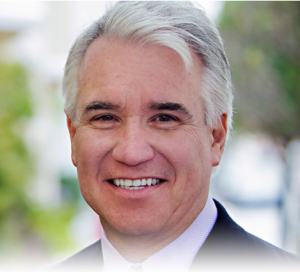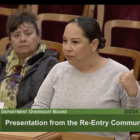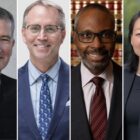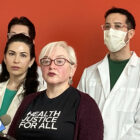Fourth interview is with George Gascon
One of the more important and most overlooked races in San Francisco is the campaign to be the city’s next district attorney. When Kamala Harris left the post for state office last year, outgoing Mayor Gavin Newsom appointed then-Police Chief George Gascon to take her place. Now, Gascon is running for a full four-year term, but faces stiff competition from four other candidates. Previously, we spoke with Bill Fazio, David Onek, and Sharmin Bock. Today, we sit down with the sitting District Attorney and former Police Chief George Gascon.
Q: So just tell me a little bit about yourself and your background.
A: So, I was born in Cuba, I was an immigrant, came here when I was 13. I was raised in the LA area, came from a blue-collar family, actually dropped out of high school. But then eventually went back to school, got my college degree, my law degree, worked in policing for about 30 years, for the LAPD. I started from the bottom, went all the way to the number two spot. Then I went to Arizona for three years as the chief of police and came here to San Francisco as the chief of police originally and then became the district attorney ten months ago. Primarily, what I have been involved in at the local, national, and state, and even the international level is issues of public safety, over-incarceration, over-criminalization of minority communities, and dealing with immigration issues has been a primary focus of mine as well as dealing with the public safety issues around those.
Q: So how has the transition been from law enforcement into a primarily political and managerial role, leading a team of lawyers?
A: I have to put the political piece to the side, because that is definitely a different animal. But as far as the leading a team of lawyers, I have been involved in leading in the criminal justice system for many years. I have been a lawyer for many years myself. Did a lot of labor work within the LAPD, had other attorneys working for me. And have been working at a very high level dealing with the criminal justice system for many years. I’ve been on the board of the justice center for the council of state governments, dealing with justice reinvestment. So I’ve been involved in the criminal justice system for many years, dealing with large crime problems, dealing with issues of over-incarceration, dealing with issues of over-criminalization. Strategically what’s the best way of dealing with crime problems in big cities. So that piece of it hasn’t really been much of a shift. Having to run for office is a completely new experience for me.
Q: So how comfortable have you felt stepping into this new role and calling the shots on who gets charged with what in big cases, and giving advice to attorneys who are having trouble with their cases. Has that been difficult for you?
A: No, actually, it came quite naturally. And frankly, that’s the reason why I’m here. For probably a good part of a decade, one of the passions of mine has been how do we reduce the criminalization primarily in communities of color. And as a police executive you have certain control as to how do you deploy your people, what do you do with them, what kind of prevention programs you put in. But the district attorney is really the one that controls the policy for the county as to what is going to be prosecuted, how it’s going to be prosecuted. Being in the DA’s office I’ve been fortunate to have greater impact and influence than I would from the law enforcement side.
Q: That’s something I want to talk about, actually, as a district attorney, you’re really creating criminal justice policy for a county. What kinds of policies do you look forward to implementing if you do win this election, and what are the biggest concerns for you in terms of public safety in San Francisco?
A: So what I did already, and bear in mind that I’ve been in office now for 10 months and I haven’t been waiting to get elected, I wanted to make sure that I started working on the reforming of our criminal justice system very quickly. I wanted to do several things. Number one, I wanted to make sure we started taking a lot of low level offenses out of the courtroom. And by implementation decriminalizing a lot of stuff. So we have created a concept called neighborhood courts. And neighborhood courts basically we’re taking a lot of low level drug offenses, a lot of low level property crimes and taking them out of the courtroom and putting them into an arbitration model at the neighborhood level where we have community arbitrators who are trained at our office in restorative justice models. So there’s no incarceration, there are no fines. If an individual is deemed to have done the allegation, whatever’s alleged, the sanctions are community service, there may be restitution to the victim.
Q: So there’s a couple things I have to ask you about because they’re what your opponents are bringing up more than anything else. And one of them is this issue with the DNA lab. And I know part of the lab, the drug portion has been shut down. But I know there’s at least some of your opponents are saying that the DNA lab is in a situation where it could lose its accreditation and could compromise a lot of cases involving violent crimes. So what’s the status with the DNA lab and what’s your plan for dealing with its issues long term?
A: So first of all, I think it’s really important and my opponents and I do not talk about this, most of the problems that originated from the crime lab preceded me. I came here as the chief of police, actually I was brought here to work on a lot of problems here that have been here for years. When I became aware of the problems with the crime lab, within, actually within less than five hours from the time I became aware of the crime lab problem, I did a press conference, brought the public in, talked about it. I did a first level of analysis and determined that controlled substances was the main part of it. We shut that down. I called the Justice Department and asked the Justice Department to come in and do an evaluation. It’s important to know also that the crime law is not run by the DA. It’s run by the police department. The DA really has very little control over what goes on in the crime lab. So I did all those things from within when I was actually told and looked at all the evidence, and when I started opening up the doors. During the subsequent months and actually almost a year, we conducted a tremendous investigation, and the justice department actually conducted a tremendous operation, did a very thorough investigation and at the end of that investigation we learned that the DNA lab was working fine. There were some problems, but the DNA lab was working fine. There were some areas where we had problems with some of the protocols and those protocols were fixed.
Q: So you’re confident that the DNA lab that we currently have and use is capable of handling these cases?
A: Not only am I confident, I know for a fact that we’re convicting cases successfully and passing the scrutiny of the courts and the juries because the work that’s being done is being done appropriately.
Q: So let’s move on to the other issue I wanted to talk to you about and that is police oversight. Obviously there’s been some scandals with alleged misconduct by undercover officers. There’s also been issues in San Francisco about Robbery Abatement Teams and about buy-bust and whether or not those are within the realm of what we like to do in San Francisco. How do you approach police oversight and making sure that people aren’t getting unnecessarily swept up?
A: Well first of all, I think it’s helpful to put things into context. And if you look historically of where I’ve been, I’ve actually been a police reformer for many years. I work very aggressively to turn around the LAPD after the Ramparts scandal. In fact, I was the one running training for the LAPD at the time. And we actually went around working with members of the civil liberties community and the attorney general’s office and actually developed police training. We posted the Bill of Rights in every single classroom. When I went to Arizona, very similarly, I dealt with police problems there, primarily there with another agency where immigrant rights and human rights were being violated. And not only that I confronted that, I went to Congress, I provided testimony. I fought what I believe were serious cases of police misconduct.
More recently, when you look at the cases involving the Henry Hotel, where you have undercover police officers that were caught on video, allegedly violating people’s rights, I didn’t wait for anybody to tell me that I had to dismiss cases. We immediately dismissed over a hundred cases. And not only that, but as a result of that, I called the public defender. I provided the public defender records in about 5,000 cases, and we’re now working together to ensure that if there were problems with old cases, that the public defender had that information. None of that was the result of my being forced. It was my proactive action because I recognized that we cannot have a good criminal justice system if it’s not credible.
Q: So I just wanted to do some quick hits and see how you feel about specific policy issues and starting with the death penalty.
A: I think we need to get rid of the death penalty. The death penalty is problematic in multiple levels. First of all, it’s irreversible. We know that if we make a mistake, and we have seen certainly in the last few years with the use of DNA, that sometimes people who were convicted of a crime, particularly a capital crime, and then we find out they were not the person who committed the crime. You cannot fix a mistake in a death penalty case. Secondly, the death penalty in this country has had a very adverse impact on minorities and the poor. If you look at California, for instance, over 60 percent of the people that are on death row today are either a member of a minority or they’re poor. Thirdly, the death penalty does not necessarily provide closure to the victim’s family. We have to go at it and we have to convince the public that as a First-world, fully developed nation, the death penalty doesn’t belong in a country like ours. And we’re seeing that more and more states are getting rid of the death penalty. Unfortunately, an overwhelming majority of Californians are supporting the death penalty. As a matter of fact, a recent poll said that 69 percent of Californians support the death penalty. So the work is really cut out for us to be able to educate the public and get over this and get it out of our state constitution.
Q: So second question, when would you charge second and third strikes?
A: When a case comes for an arraignment in the first 48 hours, the prosecutor really does not know what they have on a case. So it makes good legal sense to put everything that you have on the table. There’s a difference between how a case is arraigned and how a case is prosecuted and what you’re going to be seeking. And what we have done is basically we will not charge a second or third strike unless there’s extreme violence and unless we can see that the threat of continuing violence is so high that this person unfortunately needs to be incarcerated because they cannot control their instincts. Which means, quite frankly, that very few cases are being charged under a third or second strike.
Q: Well I think you gotta go, so I’ll just ask you one more question that I’ve heard is true, but I don’t know if it is. Do you still carry a gun?
A: Sometimes I do, I’m authorized to do it. But actually I don’t have one today.
Q: So you’re not armed right now?
A: Not today.
This is a joint production between the San Francisco Public Press and KALW News.










